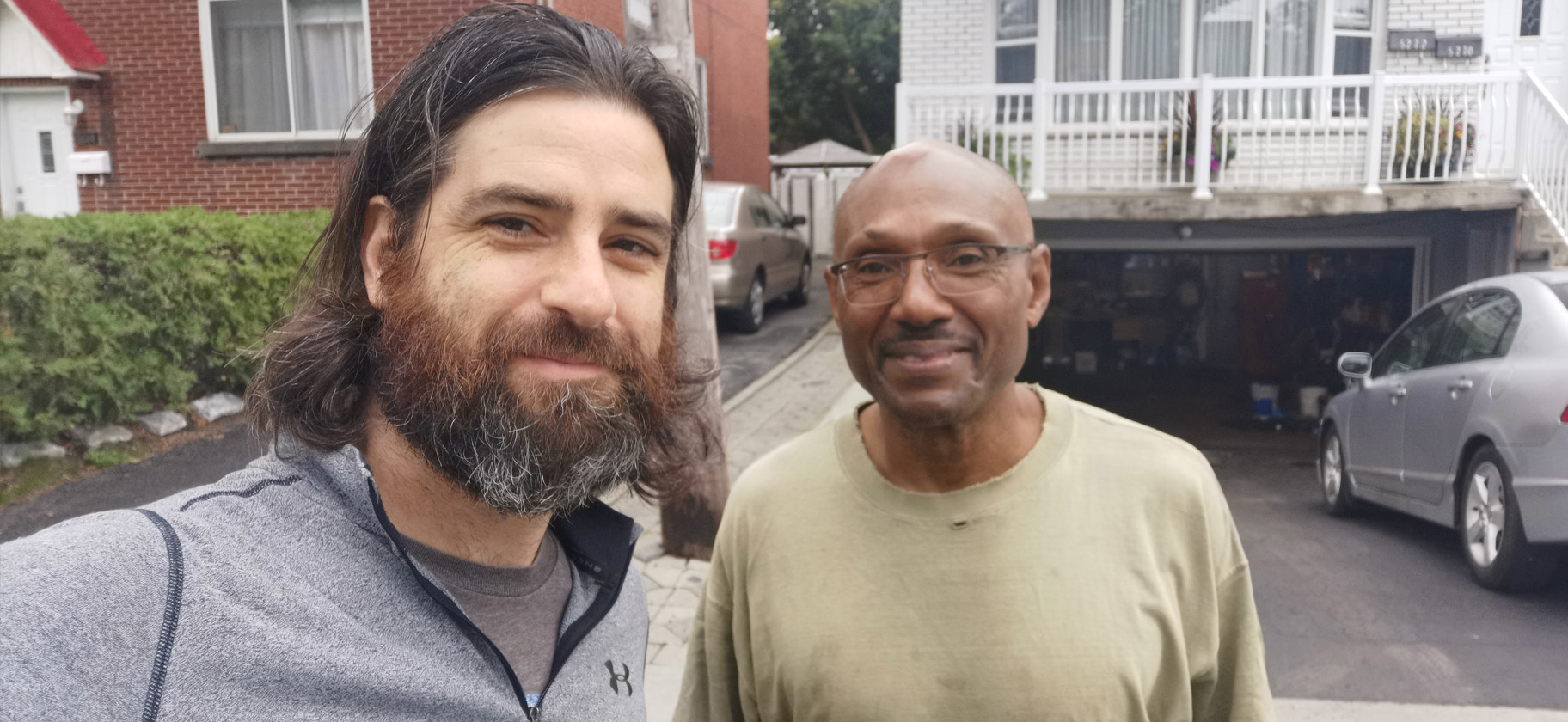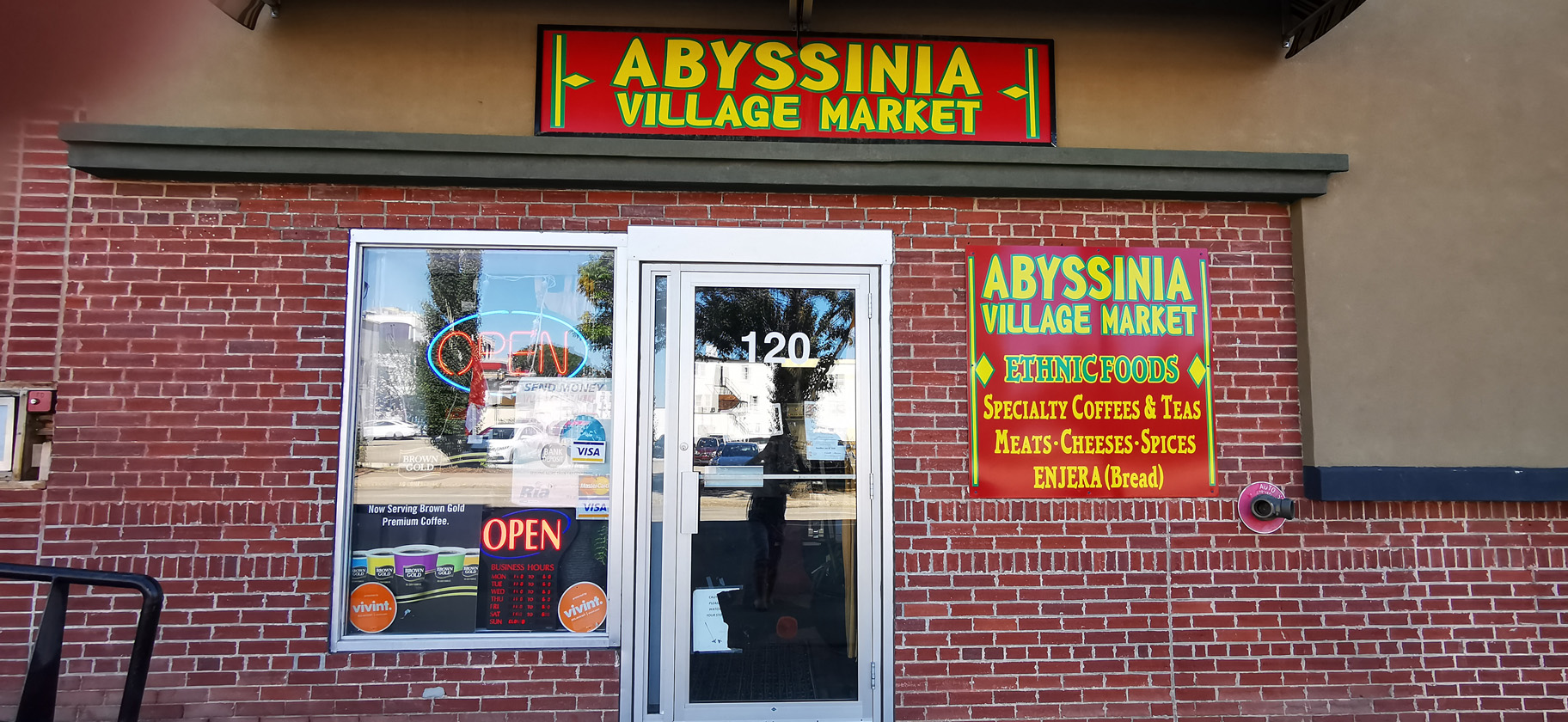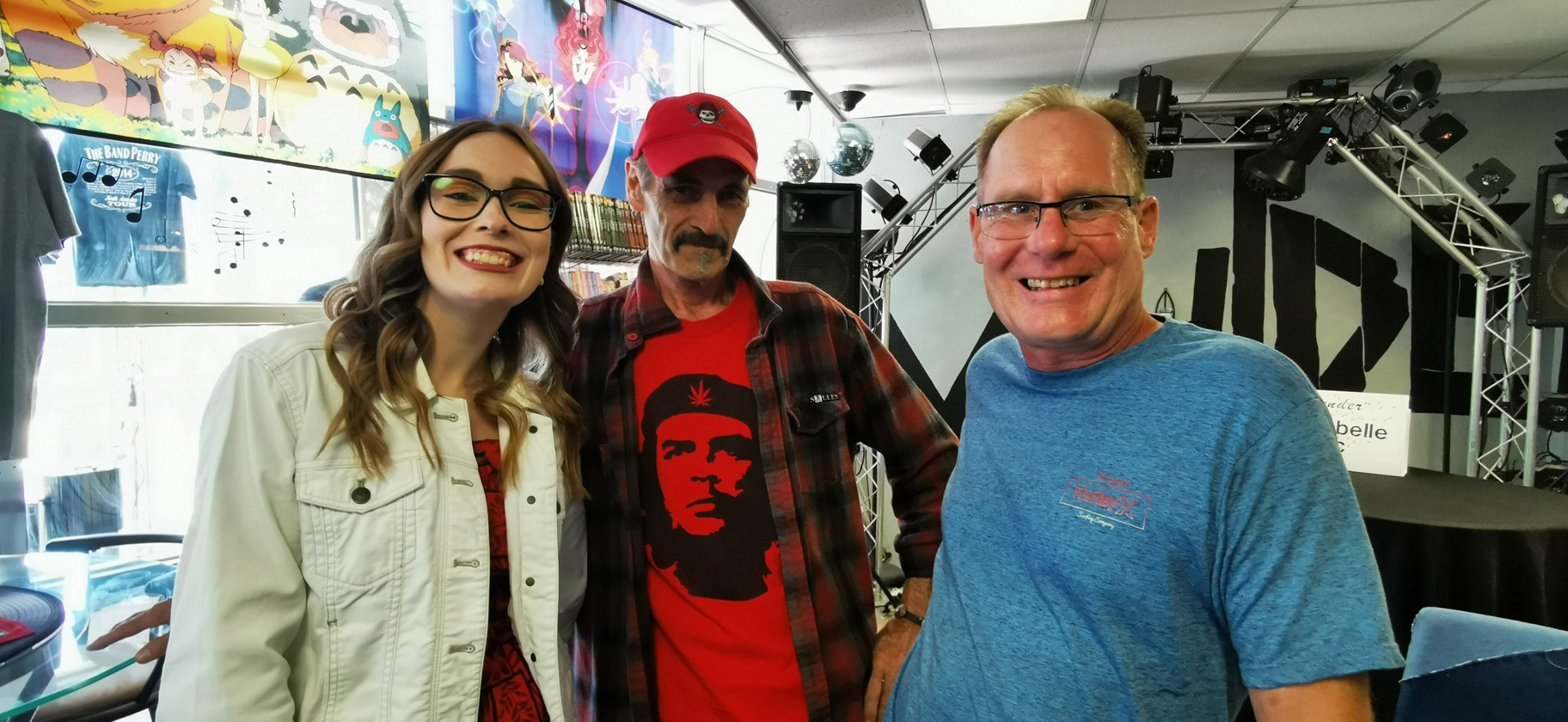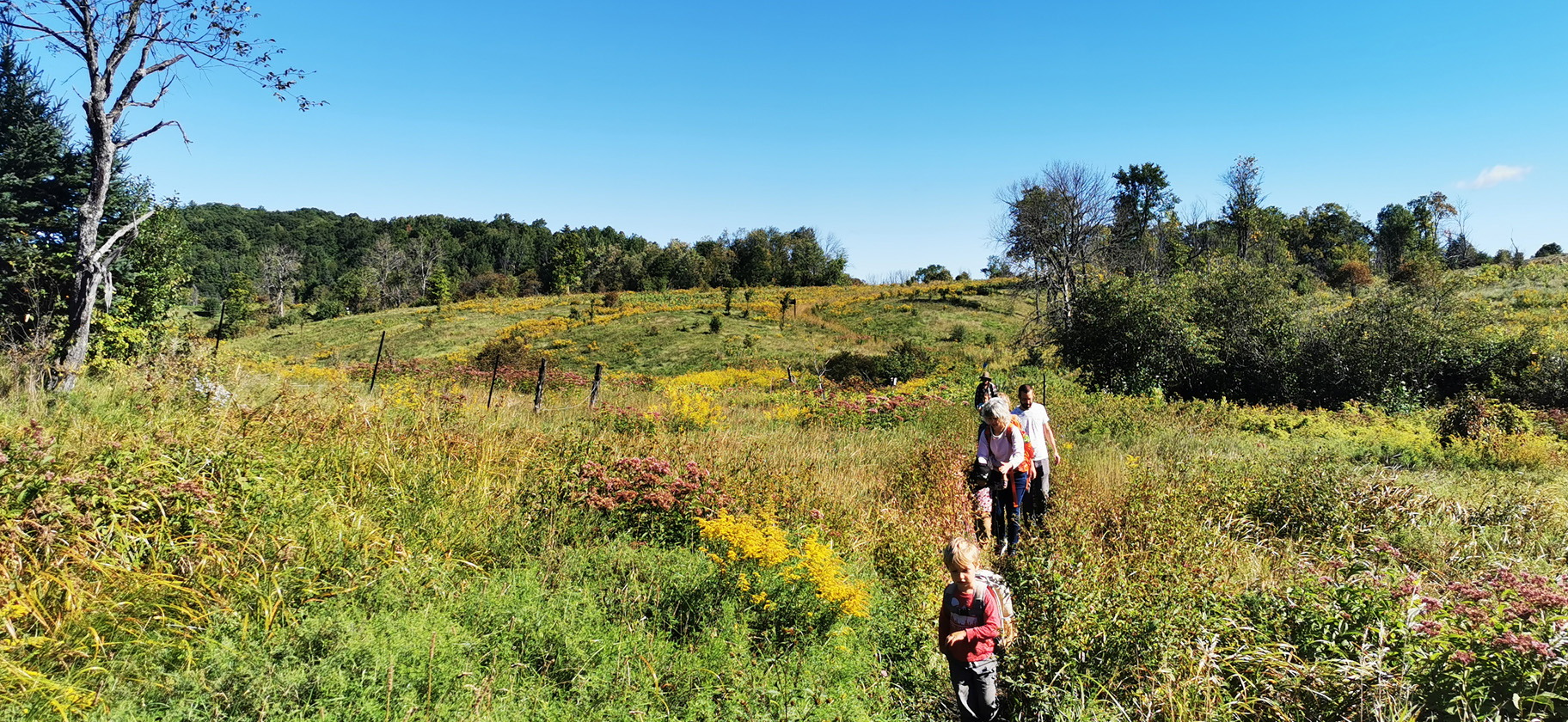People of Canada

Sean’s parents need to organize activities for him for fear that he would waste his summer days doing nothing but playing Fortnight. Unfortunately, most of the summer activities they had planned for him have been suspended indefinitely so there isn’t all that much else to do. He is about to start attending one of Vancouver’s prestigious private high schools and it is a big jump from elementary to middle school. He will need to make new friends. Originally from Montreal, this is already the fifth time he has had to change schools so he is unsure of what to expect from the change but is confident that he can manage. He spent the last months of elementary school being homeschooled by his parents and, like the rest of his classmates, attended his graduation virtually. No one is clear on what learning will look like in the pandemic world.
Jebediah is a member of the Twelve Tribes and works as a waiter at the Yellow Deli where Larry has been having the same thing for lunch every day for the last 8 years. Larry has lived in Chilliwack his entire life and, aside from venturing down into the States a few times a year for business, he sees no reason to leave. He visited London, England once and liked it just fine but didn’t see it as worth all of the hype. He works in air conditioning installation, votes conservative, and doesn’t understand why Donald Trump always seems to get such a bad rap in the media. “It always seems to be that the better one does in life,” he says, “then the haters are going to jump all over you and try to pull you down”.
Jatinder works at a fruit stand on the downtown strip in Keremeos. A late frost back in April means that the cherry crates coming in from the growers are low and half-ripe, and the peaches are weeks behind schedule. Her parents are from Pondicherry, India but she was born in BC and grew up in Keremeos. She has never been to India and has no plans to go. “My parents advise against it,” she says.
Sara works the winters at the Apex ski resort as a ski instructor and is a waitress at a bistro on the Naramata bench in the summer. She has been working at the bistro for twelve years, knows all of the summer regulars, and loves to talk wine. She has a thirteen-year-old son who just got his first job helping out with small tasks on a nearby construction site. This summer the bistro has only been open for suppers and it is only the core staff that has been working meaning that seasonal workers have been out of a job or had to find other work.
Lisa lives up on the bench and works in the emergency ward between the Penticton and Kelowna hospitals. Born and raised in Winnipeg, she and her boyfriend moved to Naramata to live in their dream home overlooking the lake. They grow grapes and rent out most of their house on Airbnb to cover the mortgage. They just adopted a puppy, a labradoodle, named Stella.
Veronica has been rocking the pixie for as long as she can remember and, working in one of Kelowna’s chicest hair salons, loves it when a client comes in asking for a cut just like it. She was about to marry a man almost twice her age but they have had to postpone the wedding because of the pandemic. She says it’s annoying, but not changing anything and that they didn’t lose any deposits. Moving to Kelowna from Vancouver late last year was a sudden change but adjusting to life took no time at all and so she is getting used to handling all of the challenges of life as they come. As long as she has Keith in her life then the rest is easy.
Anne-Marie works as a bartender at the Quartermaster in Revelstoke. She moved there from Beloeil, Québec three years ago with her boyfriend but they broke up just before the pandemic really hit. She has had trouble adjusting to being on her own and living in a small town. Normally working as a bartender is a great way to meet people but business has been slow over the summer because people are choosing to stay at home. She is getting restless and feels a bit stuck but is grateful that she at least still has a job and is able to make ends meet.
Pat grew up in Toronto in the sixties when the Leafs were actually a decent hockey team, but his heart belongs to the Edmonton Oilers. He had a bit of a problem with authority growing up and was expelled from university for selling dope. After dropping out, he decided to join the army and shipped out to Vietnam. “Darkies in the front, non-coms in the middle, and Americans in the back,” is how he describes his experience of taking orders in combat. After returning home from the war, he got a job as a trucking route broker where he worked for more than thirty years before retiring. His wife died last year so now it is just him and his Shih-Tzu Quincy in the apartment. He plays pickleball with friends three times a week and delivers circulars and the local paper between 1 am and 4 am every day.
 Hanna was born in a township near Addis Ababa. She moved to Canada seven years ago and helps run the Abyssinian Market on 49th street in Red Deer. She is working on becoming a Canadian citizen but the virus has slowed down the process. Injera, the buckwheat crepe that is synonymous with Ethiopian cuisine, is the specialty of the house. The Ethiopian community in Red Deer isn’t very big compared to what it is in other cities like Edmonton and Calgary, so she never expects a high volume of business, but the pandemic has made it even more difficult for the shop to break even let alone turn a profit.
Hanna was born in a township near Addis Ababa. She moved to Canada seven years ago and helps run the Abyssinian Market on 49th street in Red Deer. She is working on becoming a Canadian citizen but the virus has slowed down the process. Injera, the buckwheat crepe that is synonymous with Ethiopian cuisine, is the specialty of the house. The Ethiopian community in Red Deer isn’t very big compared to what it is in other cities like Edmonton and Calgary, so she never expects a high volume of business, but the pandemic has made it even more difficult for the shop to break even let alone turn a profit.
Despite the economic downturn, businesses in Red Deer are finding innovative ways to survive. Restaurants and cafés along 50th street have converted some of the city parking into outdoor terraces to attract customers. Will runs the VinLDen which only opened a month before the lockdown in Alberta began. Aside from selling cards, comic books, and memorabilia, local artists have flocked to the store to sell their crafts including earrings, repurposing old CDs into handbags, furniture that has been upholstered with old clothes, and custom scrunchies. Local musicians like Madison Lovelace do live performances there and with limits on gatherings the VinLDen has worked out how to show these performances virtually. There is a 420 corner dedicated to Bob Marley and a whole section dedicated to one of the store’s most loyal customers, Donovan, and his Kiss memorabilia collection.

Olesia is from Ufa, Russia and works at City Roast Coffee right next door to the VinLDen. She is in her mid-sixties and has only lived in Canada for a little over a year. She doesn’t speak much English and what she does know is centred around coffee and baked goods.
Alison and Kim live in Calgary and met each other about 10 years ago playing for the same women’s soccer team. They are the only people in each other’s “bubble” and get together regularly after work and on weekends to ride out the doldrums of the pandemic mostly drinking wine and watching Netflix or reruns of Forged in Fire on the History Channel. Life has been a little bit boring but it could be worse. Now entering their forties, they have watched several of their friends’ relationships fall apart over the last few months because of the strains brought on by the pandemic. They aren’t thrilled about being single and having fewer opportunities to go on dates and meet new people but they have each other.
Edith is in her 60s and has lived in Hanna, Alberta all of her life. She knows that Nickelback is from her hometown but she has never heard their music. She prefers to point out that Stanley Cup Champion Lanny MacDonald and she went to the same elementary school.
Jody and Dave, both born and raised in Saskatoon, are about to get married. He is 28 and she is 26. She works as a dental hygienist and he does the contracts for a local construction company. They have listed one of the rooms in their home on Airbnb as a way to make some money to pay for the wedding. They say that the experience with Airbnb has been mostly good but there have been some misunderstandings about their accommodation. There is a listing where guests can rent out the whole house and, a few times, guests have only rented out the room thinking that they were renting the entire house. Returning home one night, Dave and Jody opened the door to find, instead of a happy house guest, a dominatrix and her submissives surrounded by all of the accoutrements associated with BDSM. The experience led to a call with Airbnb support and prompted them to add a disclaimer to their listing that guests should double-check which listing, the room or the house, they have actually booked.
Soo Min works at a Husky gas station in Minnedosa, Manitoba. She is in her early thirties with her hair up in pigtails. She pumps the gas, washes the windshields, and runs the till for every customer. She’s got axel grease in her fingernails and Korean grit in her bones. “Were you born and raised here in Minnedosa?” I ask. “You want anything else besides the gas?” she answers. “No,” I say. “Same answer to your question,” she says smiling and tearing the receipt from the card reader.
Trevor is Métis and lives in one of the First Nations communities north of Winnipeg. He is 16 and it’s a sunny day on the weekend so he has travelled down to The Forks with a few friends to hang out. He is a cadet and was recently promoted to sergeant. The honour has filled his spirit with tremendous pride and he enjoys showing off his march. He puffs out his chest with his arms stiff and at his sides. His knee joints stay loose but his leg stays straight as he swings it purposefully into the air. He takes an elegant stride forward and continues for three steps before performing a swift and deliberate 180-degree about-face.
Akim was born in Nigeria and has been living in Canada for the last ten years working as a teacher in communities in Northern Ontario. He has had the summer off and has been living in Dryden for the last couple of months taking it easy before he has to go back up and work. Before moving to Canada, he studied and lived in Arkhangelsk, Russia. He met a girl there and goes back every so often to visit. He misses Russia but he makes good money doing what he is doing. He likes Canada but says that he had never encountered racism until he got here. He is a bit suspicious of Canadians and of most North Americans generally, whereas Russians, he says, are more direct and don’t know how to hide how they feel. He says that watching the news in Canada about Russia makes him laugh and cry a little because Americans learn all of the wrong and worst things about it. The Canada that Canadians see is also not always what it seems. “If you want to see how there are really two Canadas,” he says, “take highway 599 up to Pickle Lake. You won’t think that you are in Canada anymore”. Akim has been managing the pandemic just fine. “You know,” he says, “what Americans perceive as a challenge aren’t real challenges to most Africans so this pandemic is no big deal to me”. One day he hopes to set up a website dedicated to Nigerian football. His eyes light up when he talks about the team that competed in the USA in 1994.
Steve grew up in Dryden and, after his divorce, moved into his father’s old house by the lake that he built in 1962. His first wife died young of pancreatic cancer. The second wife, with whom they have three children, just took off one day with a guy who was twenty years her junior. “She complains about what an asshole he is,” Steve says, “but apparently he’s got a massive cock so what’s an average guy like me supposed to do?” Steve owns a couple of boats and, though he’s getting older, he believes he has enough charm left in him to fool some girl into sailing around the world with him.
Sheila works at O’Brien’s Classic Grill in Kapuskasing, Ontario. O’Brien’s is a sports bar and burger joint just off Highway 11 that’s a must-stop for motorcyclists heading cross-country along the northern route. Most folks travelling from Nipigon will need to fuel up in Kapuskasing if they are on their way to Timmins or to North Bay. Business has been more or less the same despite the pandemic and though it’s all over the news it’s not something that they have seen much of. There are a few new contact tracing protocols in place and customers have to wear a mask in the restaurant unless they are seated at their table, but other than that a beer is a beer and it costs the same now as it did before. For Sheila, the strangest change has been having the NHL playoffs playing on the TV screens in the late summer.
Kyle lives in a tent under a tree in Trinity Bellwoods Park in downtown Toronto. He was out of work and without a home before the pandemic and has lost track of time and can’t remember how long it has been since he’s been living on the street. Since the start of the pandemic, he has noticed how the park has become more crowded but that just means there are more people to hang out with and there’s always someone willing to share a bit of food or a drag. He suspects he caught the virus early on stating that in April he didn’t leave his tent for two whole days and felt miserable. He didn’t bother visiting the clinic to get tested. For months, up to and including when he felt sick, he had been living in Alexandra Park, which is right across the street from Toronto Western Hospital. There has been a lineup out the door from 8 am to 6 pm every day for the last six months. “You are not going to get me anywhere near a hospital,” he says. “No, thank you!”
Dave and Autumn live in Oakville and, not wanting to miss out on all of the fun of summer, are micro-travelling around Ontario. Although they own a cabin in Muskoka, they decided to spend a week in Niagara-on-the-Lake sampling the local wineries and restaurants. Both in their mid-fifties, they retired three years ago, have no children, are members of Mensa, and are always looking for ways to spend their money. The summer before, they spent a month exploring the wineries in France from Loire to Bergerac and though Niagara doesn’t really compare they say that that’s not the point. According to them, when the wineries in Eastern Canada try to be like the French then they just disappoint, but when a Canadian winery embraces the unique charm of its soil and surroundings it leaves a unique and positive impression.

Ali lives in Chelsea, Québec a short drive outside of Gatineau. He just moved into a new house by the river and is happy that life has worked out in such a way that he can finally afford to transplant his family out of the city. He is a self-described hypochondriac and has been tracking every bit of news of the spread of the virus since January. With two young children, he and his wife have faced their share of challenges in 2020 but they are all adjusting well and making the best of a difficult situation. Ali is trying to live a healthier life than he did in his twenties and has become an avid hiker. Living in the country affords them more opportunities to spend time in nature and the lockdown measures and limits on family gatherings have brought their little nuclear family closer together. Technology means that the rest of Ali’s social network is no more than a zoom call away and he has been hosting weekly calls with friends as a way to relieve some of his own stress as well as to check in on everyone’s mental health.
 Jose was born in Arnhem in the Netherlands. She moved to Canada twenty-five years ago and has been living in a small heritage home by the water in Pointe-Claire Village for the last eight. She has decorated the home with delicate Dutch flourishes including framed old maps and paintings and wooden clogs hanging on the walls. She is a spirited eighty-three-year-old and says that the room on her upper floor is open to anyone who wants it, pandemic be damned. “There is always someone out there who just needs a place to stay,” she says.
Jose was born in Arnhem in the Netherlands. She moved to Canada twenty-five years ago and has been living in a small heritage home by the water in Pointe-Claire Village for the last eight. She has decorated the home with delicate Dutch flourishes including framed old maps and paintings and wooden clogs hanging on the walls. She is a spirited eighty-three-year-old and says that the room on her upper floor is open to anyone who wants it, pandemic be damned. “There is always someone out there who just needs a place to stay,” she says.
Egan grew up on the streets of Jamaica in the 1970s. He came to Canada when he was just 18 years old and got a job as an auto mechanic. He worked in the shop at a Goodyear station for 30 years but now works out of his garage doing everything from oil changes and brake jobs to overhauling engines for friends and loyal clients that he has met over the years. He owns his house in Montreal West and has three grown-up children who have all earned university degrees. Working on cars is easy and fun and doesn’t feel like work to him. And if it ever does then he can always just smoke a J at day’s end and feel his troubles melt away.
Sixty-five years ago, Canada welcomed my family of refugees to its shores. Canadians are every colour and every culture and proud of the country they have built by bringing them all together turning strangers and strangeness into understanding and acceptance. We are friendly and we are kind and we apologize for no particular reason at all. We stand apart from other places as a land from everywhere, each of us imperfect in our own way but essential ingredients to the soup. Family, acquaintances, servers, merchants, lifelong friends and friends for a day and anyone willing to lend an ear or share their story are a reminder that in the most challenging of times kindness and a smile are the antidotes to any of the hardships we face. Whenever I am asked where I am from and I proudly state that I am a Canadian, no matter who I am speaking to they immediately smile back and give me a thumbs up. The world loves Canada and, with so many fascinating people filling it from ocean to ocean, it is easy to understand why.